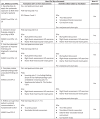Listen Before You Auscultate: An Active-Learning Approach to Bedside Cardiac Assessment
- PMID: 37915746
- PMCID: PMC10615901
- DOI: 10.15766/mep_2374-8265.11362
Listen Before You Auscultate: An Active-Learning Approach to Bedside Cardiac Assessment
Abstract
Introduction: Bedside cardiac assessment (BCA) is deficient across a spectrum of noncardiology trainees. Learners not taught BCA well may become instructors who do not teach well, creating a self-perpetuating problem. To improve BCA teaching and learning, we developed a high-quality, patient-centered curriculum for medicine clerkship students that could be flexibly implemented and accessible to other health professions learners.
Methods: With a constructivist perspective, we aligned learning goals, activities, and assessments. The curriculum used a "listen before you auscultate" framework, capturing patient history as context for a six-step, systematic approach. In the flipped classroom, short videos and practice questions preceded two 1-hour class activities that integrated diagnostic reasoning, pathophysiology, physical diagnosis, and reflection. Activities included case discussions, jugular venous pressure evaluation, heart sound competitions, and simulated conversations with patients. Two hundred sixty-eight students at four US and international medical schools participated. We incorporated feedback, performed thematic analysis, and assessed learners' confidence and knowledge.
Results: Low posttest data capture limited quantitative results. Students reported increased confidence in BCA ability. Knowledge increased in both BCA and control groups. Thematic analysis suggested instructional design strategies were effective and peer encounters, skills practice, and encounters with educators were meaningful.
Discussion: The curriculum supported active learning of day-to-day clinical competencies and promoted professional identity formation alongside BCA ability. Feedback and increased confidence on the late-clerkship posttest suggested durable learning. We recommend approaches to confirm this and other elements of knowledge, skill acquisition, or behaviors and are surveying impacts on professional identity formation-related constructs.
Keywords: Bedside Cardiac Assessment; Cardiovascular Medicine; Clinical Reasoning/Diagnostic Reasoning; Clinical Teaching/Bedside Teaching; Competency-Based Medical Education (Competencies, Milestones, EPAs); Flipped Classroom; Humanism in Health Professions Education; Online/Distance Learning; Point-of-Care Ultrasound; Professional Identity Formation.
© 2023 Meisel et al.
Figures

References
MeSH terms
LinkOut - more resources
Full Text Sources
